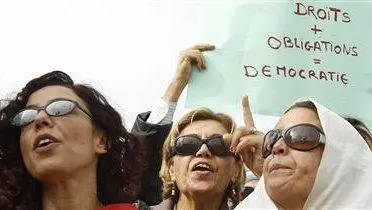Since September 11, 2001, numerous studies and surveys have attempted to dissect the divide between the Islamic world and the West. Some scholars claim that the core differences revolve around issues of gender equality rather than democratic governance per se. Researchers have found that citizens in Muslim countries tend to be less permissive about gender equality than about democratic principles in general. This thesis has been refined subsequently to differentiate the Arab and the non-Arab Middle East, but the assumption has not changed: cultural factors are the main element impeding women’s realization of full citizenship rights in most Arab countries.
In that respect, have the 2011 uprisings changed the discourse and substance of this reality? Why are women’s rights issues central to political debates in Tunisia, Egypt and Libya, while women, after contributing significantly to liberate their countries, are far from being granted full emancipation?
Women have been largely eclipsed in the transitions in Tunisia, Egypt and Libya, which is all the more striking given that these revolutions were carried out in the name of dignity and social justice. In the context of post-revolutionary emancipation, local populations feel for the first time that they have their political and economic future in their own hands. However, this same empowerment has so far failed to apply to women. After playing a prominent role in the initial phase leading to the overthrow of their autocratic leaders, female activists have been marginalized in the political space and their voices sidelined.
Progress on women’s rights is a crucial indicator of democratic development and a powerful symbol of increased pluralism. The debate on these rights, however, has stalled. Women are losing the battle to turn their ideas into political influence and to sustain the active role they played initially, although to a different extent in each of these three countries.
Some observers might be tempted to use the strong electoral performance of female candidates in Tunisia to brush aside commonly expressed fears of a human rights backlash following an Islamist takeover. But Tunisia is not a standard Arab Muslim country as far as gender equality is concerned, thanks to its long history of women’s rights, the presence of several, well-organized women’s groups and a small but powerful secular pro-Western elite.
Moreover, (free and fair) elections are only the start of democratic life and not the end of the process, though Europe and the U.S. forget this detail far too often. Maintaining a truly democratic political life remains a challenge in every single liberal democracy, and we should not expect any democratic enfant prodige to emerge from the 2011 revolutionary processes.
Western analysts and policymakers should suspend judgment until the new democratically-elected parliaments and governments in Tunisia, Egypt and Libya start making decisions focusing on women’s rights. In particular, they should closely watch any reform to Personal Status Code law. Rather than insisting exclusively on the immediate application of universal rights, which triggers antagonistic reflexes and political misunderstandings, Western governments and NGOs should focus on encouraging concrete improvements in women’s lives in the region and empower women to make their voices heard.



